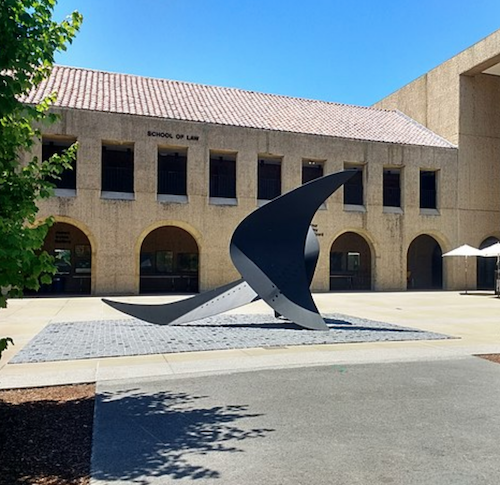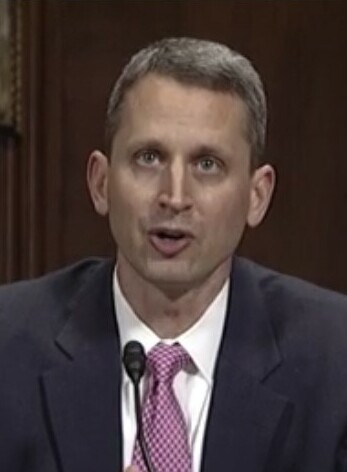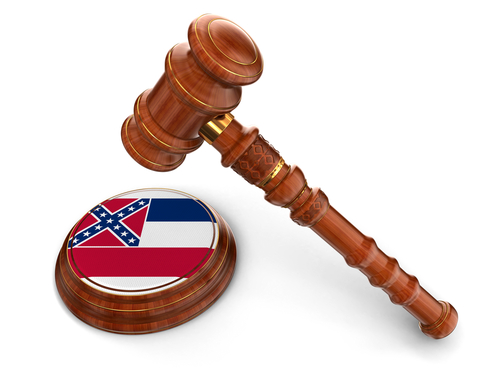Stanford apologizes after conservative federal appeals judge is heckled during Federalist Society talk

Stanford Law School in June 2019. Photo by Mx. Granger, CC-Zero, via Wikimedia Commons.
U.S. Circuit Judge Stuart Kyle Duncan has received an apology after protesters he described as “juvenile idiots” interrupted his March 9 speech with the Federalist Society at Stanford Law School.
Duncan, a judge on the 5th U.S. Circuit Court of Appeals at New Orleans, was previously on former President Donald Trump’s list of possible U.S. Supreme Court nominees. He received an apology in a March 11 letter from Marc Tessier-Lavigne, the president of Stanford University, and Jenny Martinez, the dean of Stanford Law.
“We are very clear with our students that, given our commitment to free expression, if there are speakers they disagree with, they are welcome to exercise their right to protest but not to disrupt the proceedings,” the letter said.
“In addition,” the letter said, “staff members who should have enforced university policies failed to do so, and instead intervened in inappropriate ways that are not aligned with the university’s commitment to free speech.”
The Stanford Daily, the National Review and Original Jurisdiction covered the apology and the controversy. Other publications with coverage of the heckling include Reuters, the Washington Free Beacon and Fox News.
Duncan is former general counsel of the Becket Fund for Religious Liberty. He was in the news in January 2020 for an opinion in which he refused to refer to a transgender inmate by her preferred female pronouns. He said using preferred pronouns could unintentionally convey tacit approval of a litigant’s underlying legal positions. His opinion rejected the inmate’s motion to change court records to reflect her new name, holding that the court didn’t have jurisdiction to consider it.
 Judge Stuart Kyle Duncan in November 2017 during his nomination hearing. Photo from the U.S. Senate Judiciary Committee, PD US Congress, via Wikimedia Commons.
Judge Stuart Kyle Duncan in November 2017 during his nomination hearing. Photo from the U.S. Senate Judiciary Committee, PD US Congress, via Wikimedia Commons.
Duncan’s March 9 speech was titled, “The Fifth Circuit in Conversation with the Supreme Court: COVID, Guns, and Twitter.”
Before the event began, 100 protesters booed people as they walked in, calling out some of them by name, according to Original Jurisdiction. Protesters who came into the room carried signs, such as “Respect Trans Rights” and “Be Pronoun Not Pro-Bigot.”
After Duncan took the stage, “the protesters booed and heckled continually,” Original Jurisdiction reported. “For about 10 minutes, the judge tried to give his planned remarks, but the protesters simply yelled over him.”
Protesters yelled phrases, such as: “You’re not welcome here, we hate you!” and “We do not respect you, and you have no right to speak here! This is our jurisdiction!” and “We hate FedSoc students. F- - - them, they don’t belong here either!”
After about 10 minutes, Duncan “became angry, departed from his prepared remarks, and laced into the hecklers,” Original Jurisdiction said. “He called the students ‘juvenile idiots’ and said he couldn’t believe the ‘blatant disrespect’ he was being shown after being invited to speak. He said that the ‘prisoners were now running the asylum,’ which led to a loud round of boos. His pushback riled up the protesters even more.”
Duncan asked for an administrator to help restore order. The associate dean for diversity, equity and inclusion, Tirien Steinbach, came to the podium. The Foundation for Individual Rights and Expression posted a transcript of her remarks.
Steinbach said she was uncomfortable because “this event is tearing at the fabric of this community.” And it is uncomfortable to say, she said, “that for many people here, your work has caused harm.”
“If you do choose to stay here,” she said, “I do think we should give space to hear what Judge Duncan has to say, and I hope that also you will take the question and answer and comments section to say what you need to say and ask the questions you need to ask. I’m really grateful to be in this institution. I look out and I don’t ask, ‘What is going on here?’ I look out and I say, ‘I’m glad this is going on here.’”
During the Q&A session, the questions and answers “were generally contemptuous,” Original Jurisdiction reported.
After the event, Duncan told the Washington Free Beacon that the protesters had treated members of the Federalist Society like “dogs- - -,” and Steinbach’s remarks chastising him were a “bizarre therapy session from hell.” He told Reuters that he was “offended” and “disturbed” by the protesters’ “deeply uncivil behavior.”
“I get where my critics are coming from, and I understand why they don’t like me,” Duncan told Original Jurisdiction. “They claim that I am marginalizing them and not recognizing their existence. But this is hypocritical of them since that’s exactly what they are doing to their classmates in FedSoc.”
After receiving the apology letter, Duncan told the National Review and Original Jurisdiction that he accepted the apology. He said he hoped that a similar apology is given to the Federalist Society members who invited him to speak. And he said he hopes that Stanford takes “concrete and comprehensive steps” to make sure that there is no repeat of such disruptive behavior.
Write a letter to the editor, share a story tip or update, or report an error.



